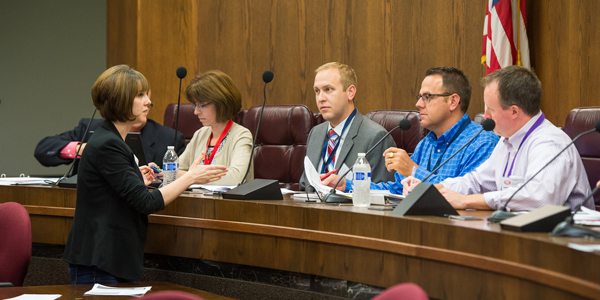In a twist of irony, about 40 executive MBA students acting as legislators and advocates voted in a slight increase in taxes to balance a mock state budget on Wednesday, July 22nd. The students, many of whom are employed in Arizona businesses, passed the final vote after two days of learning about policy making and budget decisions from some of the state’s top lawmakers, staff and leading advocates as part of a course called Business Strategy and Public Policy at the W. P. Carey School of Business at Arizona State University.
Designed to give future business leaders an introduction to the legislative process and to develop skills necessary to be effective in the public policy arena, the course is one of only a dozen or so classes of its kind in the nation to be offered to executive MBA students.
“This is a unique opportunity for executive, master’s-level students, many of whom are interested in becoming business leaders, to learn about the processes at work at the state and national level and where they can have an influence for their industries throughout the process,” said Gerry Keim, professor of management at the W. P. Carey School who oversees the class.
Keim works closely with Cox Communications, which has coordinated and run the program for the past nine years at the state senate building at the capitol. The intensive workshop assigns each MBA student a role of advocate, state senator or representative. The class elects a governor, senate president and speaker of the house who then make subcommittee appointments. An abbreviated state budget is introduced and students interact based on their roles to pass a new balanced budget, as required by the Arizona State constitution.
Megan Faust, a corporate controller, was assigned to be a state senator.
“The role of a state legislator was very challenging and demanding,” said Faust. “The number of issues and constituents I needed to consider and then prioritize with limited state funds was made apparent to me in this mock budget session. I have a renewed respect and feel particularly grateful to the legislators we have in office for their time and energy invested to make tough decisions for our state.”
Reflecting the real process, the group had difficulty reaching a consensus on a unified budget. In the last hour and after two days of negotiation, the group voted in a slight tax increase, balancing the budget and completing the exercise.
“Making decisions like when to raise taxes, and on what constituents, is difficult. No matter what decision you make, someone has to pay the bill,” said Matt Anderson, a physician who was elected senate minority leader. “Participating in this budget exercise was eye opening, and I now have a new understanding of the delicate balance our state leaders must find during each budget session.”
The class will go to Washington, D.C. later in July to learn about the federal process.
“Our founder, James Cox, believed in community and civic involvement.” said Michelle Bolton, director of government relations for Cox Communications.
“Some of the ways he led by example include serving as governor and as a member of congress for Ohio and running for president in 1920. To follow this corporate commitment, for the last 9 years, Cox has been proud to partner with ASU’s W. P. Carey School of Business to help educate students on the democratic process in our state.”




